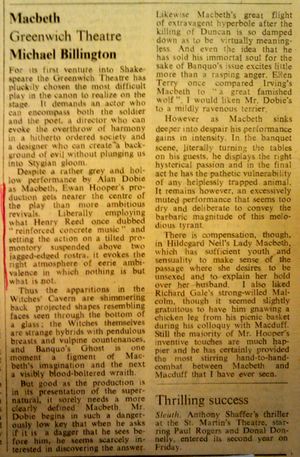DD140642
From WikiDelia
Jump to navigationJump to searchDD140642 is a newspaper clipping of a review of Macbeth (1971) by Michael Billington, who was working as drama critic at The Times newspaper at that point in his career.[1]
Transcript
Macbeth Greenwich Theatre Michael Billington For its first venture into Shake- speare the Greenwich Theatre has pluckily chosen the most difficult play in the canon to realize on the stage. It demands an actor who can encompass both the soldier and the poet, a director who can evoke the overthrow of harmony in a hitherto ordered society and a designer who can create a back- ground of evil without plunging us into Stygian gloom. Despite a rather grey and hol- low performance by Alan Dobie as Macbeth, Ewan Hooper's pro- duction gets nearer the centre of the play than more ambitious revivals. Liberally employing what Henry Reed once dubbed "reinforced concrete music" and setting the action on a tilted pro- montory suspended above two jagged-edged rostra, it evokes the right atmosphere of eerie ambi- valence in which nothing is but what is not. Thus the apparitions in the Witches' Cavern are shimmering back projected shapes resembling faces seen through the bottom of a glass, the Witches themselves are strange hybrids with pendulous breasts and vulpine countenances, and Banquo's Ghost is one moment a figment of Mac- beth's imagination and the next a visibly blood-boltered wraith. But good as the production is in its presentation of the super- natural, it sorely needs a more clearly defined Macbeth. Mr. Dobie begins in such a danger- ously low key that when he asks if it is a dagger that he sees be- fore him, he seems scarcely in- terested in discovering the answer. ----------------------------------- Likewise Macbeth's great flight of extravagant hyperbole after the killing of Duncan is so damped down as to be virtually meaning- less. And even the idea that he has sold his immortal soul for the sake of Banquo's issue excites little more than a rasping anger. Ellen Terry once compared Irving's Macbeth to "a great famished wolf". I would liken Mr. Dobie's to a mildly ravenous terrier. However as Macbeth sinks deeper into despair his performance gains in intensity. In tehe banquet scene, literally turning the tables on his guests, he displays the right hysterical passion and in the final act he has the pathetic vulnerability of any helplessly trapped animal. It remains, however, an excessively muted performance that seems too dry and deliberate to convey the barbaric magnitude of this melo- dious tyrant. There is compensation, though, in Hildegard Neil's Lady Macbeth, which has sufficient youth and sensuality to make sense of the passage where she desires to be unsexed and to explain her hold over her husband. I also liked Richard Gale's strong-willed Mal- colm, though it seemed slightly gratuitous to have him gnawing a chicken leg from his picnic basket during his colloquy with Macduff. Still the majority of Mr. Hooper's inventive touches are much hap- pier and he has certainly provided the most stirring hand-to-hand- combat between Macbeth and Macduff that I have ever seen.
